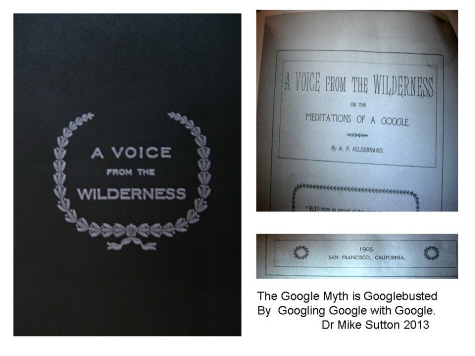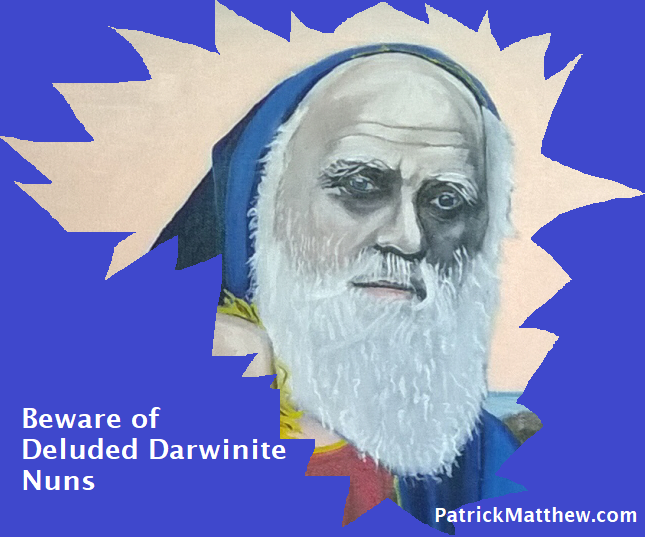br />And, in the final conclusion? Keep out of #GoogleRabbitHoles 🐇🐰🕳️ @danengber 😆https://t.co/wPukI9E5yG pic.twitter.com/gEblik0p6C
— Dr Mike Sutton (@Criminotweet) February 28, 2020
Please click the title above for the latest blog post
Friday, 28 February 2020
Keep out of Google Rabbit Holes
Thursday, 27 February 2020
On Darwin and Matthew: What is the question?
Agreed. Such as "Did Darwin and Wallace and all their fellow naturalists REALLY not read Matthew's prior published theory that Darwin and Wallace replicated along with Matthew's unique explanatory examples and terms - as Darwin claimed? And the answer = No. And Darwin also lied. https://t.co/fOpOQ8qjU5 pic.twitter.com/ai3nYOMMFP
— Dr Mike Sutton (@Criminotweet) February 27, 2020
Was Samuel Butler Right about Charles Darwin Being a Dreadful Plagiarist?
Was #SamuelButler right about Darwin being a massive plagiarist? Or was he wrong?— Dr Mike Sutton (@Dysology) February 27, 2020
If you are not disinterested in such a question, you can decide for yourself. Just weigh the verifiable evidence.
:https://t.co/T8ci2WP98u pic.twitter.com/rxfGAdEHtv
Monday, 24 February 2020
The Darwin Industry Oil Tanker and Tugboat Analogy
There once was a stain upon the silence.
Historian of Science Ton Munnich's Darwin Industry oil tanker & tug boat artistic analogy of the impact of New Data on the history of scientific discovery regarding Darwin's & Wallace's proven oil slick of glory thieving plagiarizing science fraud on the scientific community. pic.twitter.com/d9DurWSawC
— Dr Mike Sutton (@Criminotweet) February 24, 2020
Brian J Ford was Plagiarized and Darwin was a Plagiarist
.Latest article in my Critical Focus column looks back at the ten years during which the series has run. It's topped with this photo from my first column (50 years ago), oops.
— brianjford (@brianjford) February 24, 2020
Plenty of controversy, from global warming to plagiarism at the highest level: https://t.co/GJY46d7JFR pic.twitter.com/5AxFKr9Wcx
NONSCIENCE DUE FOR RE-LAUNCH
— brianjford (@brianjford) August 29, 2019
My satire on the future of science was written fifty years ago. It is due to be re-issued next year. So much of what it predicted has come true; science has become a money-grubbing racket. Soon everyone can see how much of it predicted where we are! pic.twitter.com/7Qnfiu8q4x
Sunday, 23 February 2020
Time has run out for Darwin and Wallace - TikTok- TicTock. Plagiary exposed between all the ticks and tocks of the past 160 years
This #TickTok video - is a tribute to #CharlesDarwin and #AlfredWallace The "Science Fraud by Glory thieving Plagiary Kings"
— Dr Mike Sutton (@Criminotweet) February 23, 2020
Made by Eleena Sutton (aged 10),
Music by Warren Zevon.
Starring Charles Darwin, Alfred Wallace and Mike Sutton pic.twitter.com/hPDtP4yAMg
Friday, 21 February 2020
Samuel Butler Nails Charles Darwin's Sly Glory Thieving Plagiarism in the 19th Century
.Actually, @BiologiaPensamt in "Luck and Cunning" Butler accused Darwin of plagiarizing Patrick Matthew most of all.— Dr Mike Sutton (@Dysology) February 21, 2020
I dare anyone to try to get the #Wikipedia Darwinite-paid professional editors to allow that fact about Matthew in the worst Encyclopedia. https://t.co/sYKkVvjZ5b pic.twitter.com/OyWEFrdPnn
Is it a #ConspiracyTheory or significantly evidenced yet painful fact that paid #Wikipedia #DarwinIndustry editors are slyly covering up Darwin's & Wallace's plagiarism of Patrick Matthew's prior published theory? Get the facts and decide for yourselves: https://t.co/MYlC6OyXZa pic.twitter.com/zPo2zGCpCQ— Dr Mike Sutton (@Criminotweet) February 22, 2020
 |
| Page 87 of Butler's 'Luck or Cunning'
Above we see Butler suggesting (as Darwin's biographer Clarke later did) that Darwin suffered from cryptoamnesia when he plagairised Matthew. (see a relevant blog post on this page of Butler's book Here)
|
Are the questions actually the answer to Darwin's and Wallace's plagiarism of Matthew and Dagg's sly and jealous plagiarism of me?
Blasphemy against Darwin the Plagiarist God of Biologists versus REAL Hate Crime
Unless it is blasphemy against Darwin The Plagiarist and his credulous flock - eh Ric_herd? 🤣🤣🤣🤣https://t.co/tbczMF32wo pic.twitter.com/Dbn2DNC9B7— BlessedVirginDarwin (@OnNavalTimber) February 21, 2020
. It appears that some leading Biologists are completely useless at criminology and the law. No wonder they don't even know what plagiarism and science fraud is
.Has @RichardDawkins lost his mind? Looks like he thinks it is not a crime to point, for example, at a Black person and shout "Ni#gger!" at them. Or shout "P~aki b'stard!" at a South Asian in the street. Completely bonkers? @DrIreneZempi @BscHcn @HateCrime_Leics @HateCrime_Leics https://t.co/ocG9PKP9mh— BlessedVirginDarwin (@OnNavalTimber) February 21, 2020
.Did you know Charles Darwin is newly proven to be a scientific nun entity? Darwinian nuns are a demented pseudo-science weirdo cult that spreads myths about the history of discovery of evolution by natural selection: https://t.co/6vCXmbvN56 pic.twitter.com/OTn0VJyyuL
— Supermythbuster (@supermyths) February 20, 2020
Expert peer reviewed article "On Knowledge Contamination" - about Darwin's & Wallace's 100% proven lies and science fraud by plagiarizing glory theft of a prior-published theory passes 30,000 views today.
— Supermythbuster (@supermyths) February 21, 2020
NOW THAT'S WHAT I CALL #KnowledgeContamination: https://t.co/Ts5EQd4J1m pic.twitter.com/NcfiRVAn0Z
Monday, 17 February 2020
Dagg the Plagiarist Cyberstalker Whack Job
All the details of Dagg's disgraceful jealous and sly plagiarism of my originally unearthed (Sutton 2014) bombshell Selby cited Matthew in 1842 discovery (and bragging about that on Wilkipeda - the worlds worst encyclopedia) in a ludicrous - newly unearthed facts avoidance - paper in the Linnean Journal can be found here.
.#DaggThePlagiarst - who slyly & jealously plagiarized my original 💣🎇bombshell Selby cited Matthew in 1842 unearthing in the Linnean Journal @LinneanSociety @BiolJLinnSoc - is another Darwinite loony total whack job who is cyberstalking me. Proof here: https://t.co/z0YfIdttEL— Dr Mike Sutton (@Dysology) February 17, 2020
.Notice silence of the disgracefully unscientific plagiarist facilitating @BiolJLinnSoc journal on Dagg's sly jealous plagiarism of my unique Selby cited Matthew discovery. Perhaps they're desperately trying to cover up their 1858 facilitation of the worlds greatest science fraud? https://t.co/EQEPrDv4hW pic.twitter.com/11jHEwmsGN— Dr Mike Sutton (@Dysology) February 18, 2020
.The @BiolJLinnSoc is a disgrace to science. Why? Because today it facilitates jealous plagiarists in order to cover up Charles Darwin's and Alfred Wallace's plagiarism of Patrick Matthew's origination of the world's greatest scientific breakthrough: https://t.co/GBDpd5OhMT pic.twitter.com/0YQsgBK5ba— BlessedVirginDarwin (@OnNavalTimber) February 18, 2020
.My view entirely . Media don’t ask questions . People in DWP don’t stand up through their hierarchy to argue for decent people . People in homes children included get abused and no one speaks up . The monarchy flirt with corrupt people and don’t help investigations.We are corrupt https://t.co/hCjymIBTMC— Brendan Rafferty (@BrendanRaffer16) February 17, 2020
Fact of the matter is that this absolute raving lunatic cyberstalker is a @Wikipedia @FactsWikipedia @wikieditor1 prolific Wikipedia editor of their Patrick Matthew Page and the page they have on me. This is why #Wikipedia is the worlds worst encyclopedia:https://t.co/FnQUmFRH6J pic.twitter.com/Dmskt3qwxz— Dr Mike Sutton (@Criminotweet) February 16, 2020
NOTE
A number of top scientists now agree that the new data I unearthed in 2013 and published in peer reviewed science journals (here and here) and my book Nullius in Verba: Darwin's greatest secret proves Darwin and Wallace most likely plagiarized Patrick Matthew's prior published complete and detailed theory of macroevolution by natural slection: Check just some of them out HERE
Sunday, 16 February 2020
Mike Sutton's Biography and Bragging Rights (BBR)
Tuesday, 11 February 2020
Biography and Bragging Rights (BBR) Incorporating my CV
Dr Mike Sutton deemed, in 2022, to be the 31st thousand most influential person in the history of the world of all time (Here)
.
.Don't hide your light.— Dr Mike Sutton (@Dysology) February 17, 2020
Get your #swagon in 2020.
Have you published your #BioBraggingRights? (BBR)
Remember this formula #MoreSwaggerMoreSway.
The new 21st century BBR is far better than a C20th CV - whilst incorporating your current CV.
Mine is here: https://t.co/UaTg37f1Mc pic.twitter.com/gPQ42RmhEp
.
Patrick Matthew and Extinction Events
Yes Richard. Therefore Matthew was right on extinction events. Darwin the Plagiarist (blindly parroting his friend Lyell's mere belief #dysology) was wrong to mock Matthew
— Supermythbuster (@supermyths) February 16, 2020
1. https://t.co/sSxNfPDD5a
2. https://t.co/0DtDphlapo
3. https://t.co/AI2wE3t0bI
4. https://t.co/Rk3cMYpoKp pic.twitter.com/6QbMWvG1y2
Saturday, 15 February 2020
The Eternal shame of the Linnean Society, the Plagiarists Darwin & Wallace and Dagg the Plagiarist
.A tale of two plagiarists https://t.co/1DOegfCxTN— Emilio Cervantes (@BiologiaPensamt) February 13, 2020
.Indeed they do Richard. Indeed they do. Don't they Richard? Facts are facts. But some facts are more unconformable than others. Here is a scientific solution to that scientist problem. All facts are science facts: https://t.co/1SRWwmNQAL 😷😂😎🥳🤣🎉😄🥴 pic.twitter.com/TAS4VIUM6d
— Supermythbuster (@supermyths) February 16, 2020
Fact of the matter is that this absolute raving lunatic cyberstalker is a @Wikipedia @FactsWikipedia @wikieditor1 prolific Wikipedia editor of their Patrick Matthew Page and the page they have on me. This is why #Wikipedia is the worlds worst encyclopedia:https://t.co/FnQUmFRH6J pic.twitter.com/Dmskt3qwxz
— Dr Mike Sutton (@Criminotweet) February 16, 2020
Wednesday, 12 February 2020
How to Prevent Knowledge Contamination
Indeed. This #DarwinDay a number of top academics now agree that the newly unearthed data means Darwin is newly proven to be a liar, cheat & sly plagiarist of the entire theory of evolution by Natural selection. more will now follow!— Dr Mike Sutton (@Criminotweet) February 12, 2020
Check them out HERE: https://t.co/8ASVerK1wJ https://t.co/lWuMUtVbwS pic.twitter.com/HK9rXqhEgW
Tuesday, 11 February 2020
Google found the Original Google when I Googled Google with Google
How Google Once Found the Original Google with the Big Data IDD Method
Fame at Last: Google Finds the Original Google after 110 Years in a Library 'Wilderness'
Feb. 23, 2013 4:47 am
Postscript Feb 11 2020
This blog post was first published on the Best Thinking website on Feb 23 2013. That website no longer exists but the original post is archived HERE with all the images.
Original article begins:
 |
| Images of The Original Google Book 1903 Taken by Mike Sutton in 2013 |
I’ve read chapter 1 and I have to say its quasi-philosophical, religious and literary ramblings are not quite to my taste. Experts of English literature might, however find it somewhat amusingly Joycean . What does make the inter-library loan expense amazingly worthwhile is the author’s 110 year old explanation for why he refers to himself as a google. (Hildebrand 1903, p. 7):
I’ve read chapter 1 and I have to say its quasi-philosophical, religious and literary ramblings are not quite to my taste. Experts of English literature might, however find it somewhat amusingly Joycean . What does make the inter-library loan expense amazingly worthwhile is the author’s 110 year old explanation for why he refers to himself as a google. (Hildebrand 1903, p. 7):
“You will probably wonder why I style myself a “google.” Well, you know I had the effrontery to style myself a “hobo” in the “Conglomerate de Omniferia” That was a serious offense-one that it would hardly be safe to repeat. No, there is no class in creation with whom I may safely identify myself. But I need some convenient term whereby to refer to myself, and what more appropriate term could I get than “google”? That’s why I call myself a “google.”
OK, so we now know that the word google is at least 110 years old in 2013.
Next, I examine the official story of the origin of the word google prior to my Google facilitated 'discovery' of the Original Google
Unfortunately the free Mirriam-Webster Dictionary is simply not up-to-snuff with knowing anything at all veracious about Google's curious origins:
“Origin of GOOGLE
Google, trademark for a search engine
First Known Use: 2001”
Brewer's (2012, p. 585) does a far better job of telling us about the origins of the word google:
‘A US company formed in 1998 that runs the Google internet search engine. Google resulted from a research project in 1996 by two postgraduate students from Stanford University. Larry Page and Sergey Brin. Such is its dominance over the other search engines that ‘to Google’ has become a generic verb meaning to search for something or someone on the internet. The story goes that Page and Brin thought they were naming their company after Googol, the vast number 1 followed by 100 zeroes, but got the spelling wrong. Similarly, the company's headquarters in California is called the Googleplex.’.
The company’s unofficial slogan is ‘Don’t be evil’; however, its detractors have expressed concerns regarding its policies on copyright, censorship and the privacy of personal information.’
Chambers (2012, p. 442), which, incidentally, is owned by the same publishing house as Brewer’s has this to say on the subject of the words googol and Google:
[googol ] ‘…the number 1 followed by 100 zeroes…1940 in Kasmer and Newman’s Mathematics and the Imagination, coined (possibly as a word from children’s vocabulary, perhaps with some influence of the comic strip character Barney Google) by the nine year old nephew of the American mathematician Edward Kasmer when the child was asked to name such a large number.’
"You may want to know where I got the name “googol.” I was walking in the woods with my nephew one day, and I asked the boy to think up any name for the number; any amusing name that entered his head. He suggested “googol.” At the same time, he gave me a name for a still larger number: “googolplex.” A googolplex is much larger than a googol, but it is still finite. Put down one, and then follow it with zeros until you get tired. No, that is a joke, because the googolplex is a specific number. A googolplex is one with so many zeros that the number of zeros is a googol: one with a googol of zeros. A googolplex is certainly bigger than a googol. Is it googol times a googol? No. A googol times a googol would be one with two hundred zeros. I want one with a googol of zeros. You would not have enough room to write them even if they went to the furthest star, putting down zeros all the way there and making a tour of all the nebulae. A googolplex is really an enormous thing.”
[In] 1997: ‘ Larry and Sergey decide that the BackRub search engine needs a new name. After some brainstorming, they go with Google—a play on the word “googol,” a mathematical term for the number represented by the numeral 1 followed by 100 zeros. The use of the term reflects their mission to organize a seemingly infinite amount of information on the web.’
 |
| Barney Google US postage stamp |
Presumably then we have to believe that the search engine wizards Larry Page and Sergey Brin and the whole of their team, and their PR copyrighters, friends and family oddly never saw a single Barney Google US postage stamp in 1995, which was just two years earlier (see timeline below).
1. 1903 - A. F. Hildebrand pens and self publishes: A Voice from the Wilderness: Meditations of a google.
2. 1913 - Vincent Cartwright Vickers - penname V.C.V - authors and has published: The Google Book, which is an illustrated children's story book about a monster named the Google who shares Googleland with a number of exotic bird-like creatures.
3. 1919 - Billy DeBeck gives birth to the comic strip cartoon: Barney Google, which ran throughout the 1920’s and was bootlegged, at times pornographically, by Tijuana comics throughout the 1930’s
4. 1938 - Kasner and Newman coin the word Googol – after gettng it from Kasner's nine year old nephew (Kasner 1938). There is no veracious published evidence (to date at least) regarding where Kasner's nephew actually got the phrase from. Some publications (e.g. Chambers 2012) assert that he may have chosen the name because he was influenced by the Barney Google comic strip.
5. 1995 The US Postal Service celebrates Barney Google with a postage stamp.
6. 1997 Page and Brin rename their BackRub search engine Google just two years after Barney Google postage stamps are in use in the USA. And yet the Google official story is that Google's founders chose the name Google with no reference to the earlier use of that word but as a deliberate rehash of Kasmer and Newman’s word googol.
(1) Whether, due to 21 century knowledge flux (Sutton 2013), Google’s Library project will help us to trace its etymological roots further back than my 1903 Google facilitated ‘discovery’?(2) Whether we could ever satisfactorily explain the choice of the word by Hildebrand – is it merely because he thought such a childish nonsense word had never before been coined?(3) While it might be possible, can we ever know for sure – or is it plausible to suggest - that either Vincent Cartwright Vickers and/or Billy DeBeck read Hildebrand's Original Google of 1903?(4) Whether anyone at Google. or any of Page and Brin's friends or relatives ever used the US Postal Service in 1995?
The unremarked author Hildebrand is remarkable as the Original Google 110 years after self-publishing his book because its subtitle acted causally upon the naming of Page and Brin's search engine.
 |
| Googleeyed. Is this the word that influenced Hildebrand the google originator? |
How to cite this peer-to-peer research briefing article.
| AllAuthor's FavoritesThinker Recommended |

| Reply |
Recommended by 0 Thinkers
|
How will celebrate Darwin Day? https://t.co/O8hzytSiRj pic.twitter.com/9D6ect4XTt
— BlessedVirginDarwin (@OnNavalTimber) February 11, 2020
Monday, 10 February 2020
Happy Darwin Dogs Breakfast Day
To date, most historians of science and scientists have credulously swallowed the toff, King Charles Darwin's, serial lies about the discovery of evolution by natural selection and instilled that palpable nonsense into to minds of the general population. But in 2020 we can see a paradigm change taking place. Proper scientists and other veracious scholars are now citing the independently verifiable facts of how Darwin's and Wallace's influencers, friends, Wallace's Sarawak paper editor, and their influencer's influencers red and cited Patrick Matthew's (1831) prior published theory years before Darwin and Wallace even put pen to paper on the topic in a private notebook.
This is what a paradigm change looks like.
Over the past few years, I can’t think of a single conversation that we have had that both Darwin and Nullius in Verba: Darwin’s Greatest Secret (“Nullius in verba” is Latin for “on the word of no one” or “take nobody’s word for it”) and as a result of it has experienced a torrent of verbal abuse on social media. So why has Dr. Sutton been the victim of such abuse? In a nutshell, Sutton has asserted that Darwin is a fraud and that his main thesis on natural selection was stolen from Matthew without any acknowledgement. Furthermore, using a new methodological technique that Sutton developed, he believes Darwin lied about his knowledge of Matthew’s work.
 |
| Professor Dr Mark Griffiths |
Page 20 of Fraud and Misconduct in Research:
‘Plagiarism may present a particularly difficult challenge because sometimes establishing
See other scholarly affirmations of the facts over credulous propaganda beliefs HERE
In 2020, proper academics are now throwing out the dog's breakfast of credulous serial liar and plagiarist #CharlesDarwin toff worship!
See what a paradigm change in science and the history of science looks like: https://patrickmathew.blogspot.com/2020/01/lets-bin-dogs-breakfast-history-of.html …
1. Darwinites can no longer claim - as they did before my book was published - that Patrick Matthew's prior published conception of macroevolution by natural selection was unread by any naturalists before Darwin and Wallace replicated it. Because I originally discovered seven who cited the book that contains it in the pre-1859 literature. And Darwin and Wallace, and their influencers, knew four of them well. Hence it is most significantly newly discovered and 100 per cent proven that routes of potential knowledge contamination from Matthew's (1831) book into the pre-1858 minds of Darwin and Wallace most certainly do exist. The date evidence of this newly discovered publication record now debunks the old Darwinite claim that Darwin's notebooks and private essays prove he independently discovered natural selection.
2. Darwinites can no longer claim that Darwin was an honest scientist. Because it is proven that from 1860 onward, following information provided by Matthew himself. that he lied about the prior readership of Matthew's book and the original ideas in it by other naturalists. Darwin told at least seven other lies in order to convince the scientific community that he independently conceived the idea of natural selection.
3. It can no longer be claimed that Wallace was an honest scientist. Because I originally discovered that he edited one of his letters in his autobiography to conceal his claim that he thought he was owed money and favours by Darwin and his associates for cooperating with the presentation of his replication of the concept of natural selection alongside that of Darwin in 1858.
4. Darwinites can no longer claim that Matthew's conception of natural selection was contained solely in the appendix of his book. I reveal exactly how much is actually contained in the main body of his book and that Darwin lied when he wrote that Matthew's ideas were solely contained in the appendix. Because Matthew referred him to just some of the relevant text from the main body of his book and Darwin wrote to admit the fact to Joseph Hooker.
5. Darwinites should no longer claim that Matthew never understood what he conceived on the grounds that he never shouted about it from the rooftops. Because I show how the first half of the 19th century was governed by laws and conventions that forbade anyone from doing such a thing, and others from discussing it. Moreover, Matthew told Darwin as much when he explained his book was banned from Perth public library in Scotland and that an eminent naturalist could not teach Matthew's breakthrough for fear of pillory punishment. .
Dare you deal with Darwin's & Wallace's plagiarizing science fraud & serial lies? Plus some of the supporting nonsense from top scientists?
All facts. Not theory. Not opinion. Pure independently verifiable facts found in the historic publication record: https://docs.google.com/presentation/d/e/2PACX-1vSrHripdGpgIciens1jWnSlBwTktHJ9jeY_Q9ZES02G2NNjZnhYJ74FQouAAdVI38fawfI7E71ShZIE/pub?start=true&loop=true&delayms=10000&slide=id.p3 …
Thursday, 23 January 2020
The Nullius in Verba bombshell paradigm change
The IDD research method dropped Nullius in Verba: Darwin's greatest secret on the fanatical fantasy land of Darwin Word and followed it up with a second bombshell named On Knowledge Contamination.
.
Science historian Ton Munnich presents a lecture on Darwin's serial lying & plagiarizing science fraud of Patrick Matthew's theory
WORLD-WIDE WE ARE WITNESSING A PARADIGM CHANGE IN THE HISTORY OF SCIENTIFIC DISCOVERY OF THE WORLD'S MOST IMPORTANT THEORY https://www.youtube.com/watch?v=noRojlrJFlI …
The Darwin and Wallace Paradigm Change in Science
Read about the Darwin and Wallace major paradigm change in science . From honest genius discoverers to newly proven serial-lying science fraudsters by plagiarism
1. https://patrickmathew.blogspot.com/
2. https://patrickmatthew.com/
3. https://www.amazon.co.uk/Nullius-Verba-Darwins-greatest-secret/dp/1541343964 …
4. http://www.nauka-a-religia.uz.zgora.pl/index.php/pl/czasopismo/46-fag-2015/921-fag-2015-art-05 …
Image below shows best definition of a conspiracy theory that I know of. This is useful for debunking sly anti-scientific claims of those struggling against paradigm change that independent verifiable newly unearthed facts are a conspiracy theory: https://www.thecourier.co.uk/fp/news/local/perth-kinross/167010/perthshire-charles-darwin-claims-are-so-silly-claims-leading-international-academic/ … https://twitter.com/SLSingh/status/1220274601663569923 …

























